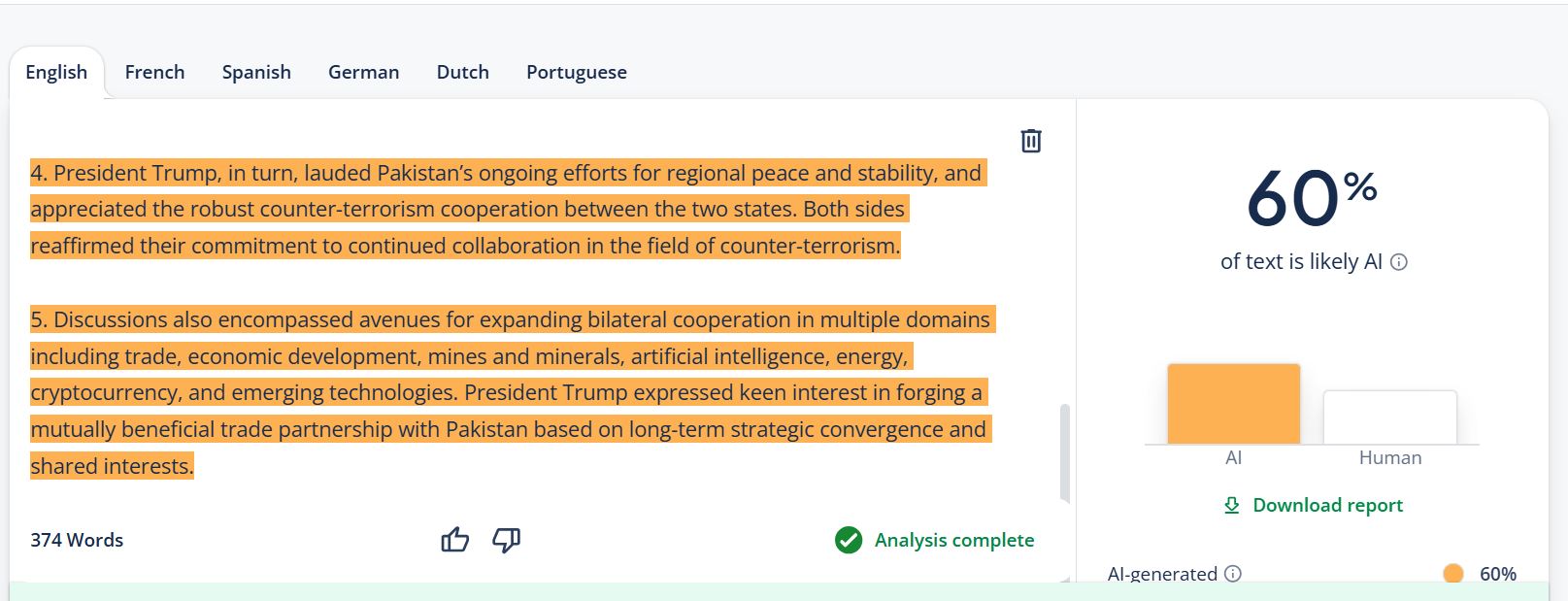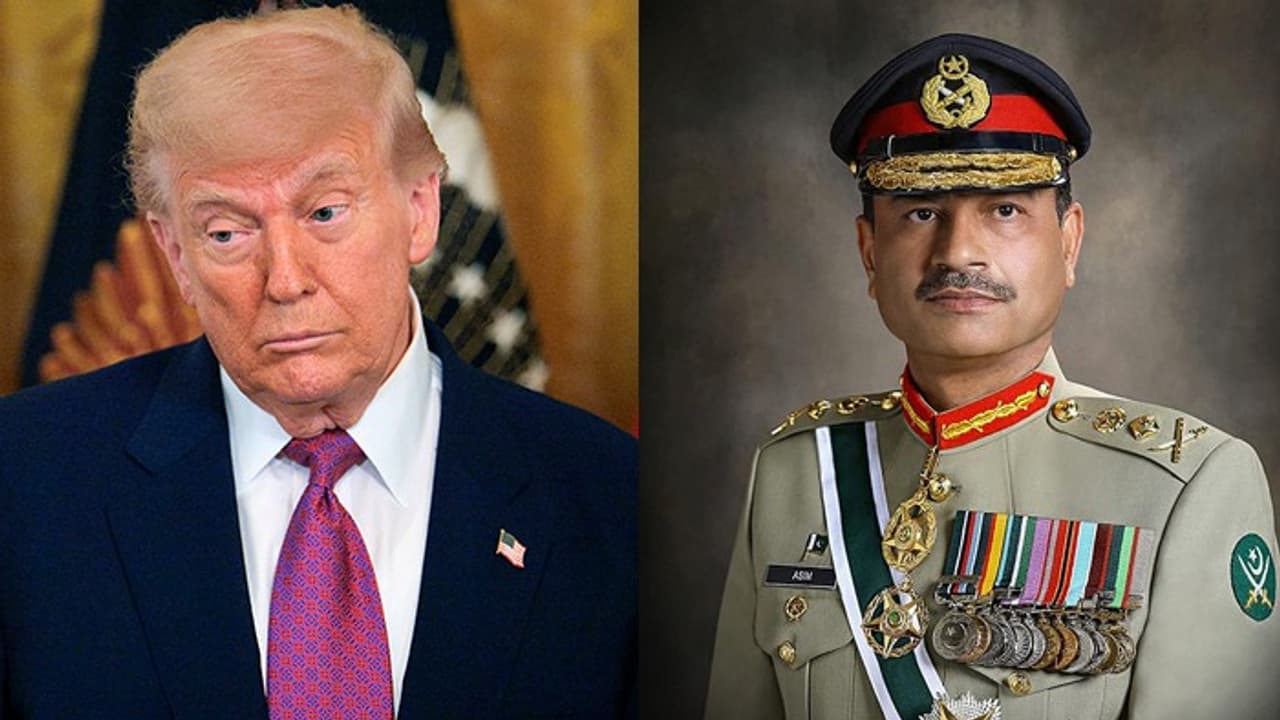Pakistan’s suspected AI-generated press release on the Donald Trump–Asim Munir meeting sparks online uproar, even as India dismisses third-party mediation with clarity and conviction.
On paper, it was a high-profile diplomatic lunch. In reality, it’s sparked a digital storm. The meeting between Pakistan’s Chief of Army Staff Field Marshal Asim Munir and US President Donald Trump at the White House on Wednesday has taken social media by storm—less for its strategic importance and more for the bizarre, overly-polished language used in the statement released by Pakistan’s Inter-Services Public Relations (ISPR).

From “statesmanship” to “long-term strategic convergence” to “multifaceted challenges faced by the global community,” the ISPR statement raised more eyebrows than admiration. Critics and commentators have pointed out that almost 60% of the release reads like it was generated by an AI trying to be more like a demo than a diplomatic document.
Internet exploded, with one user commenting, “magine using AI for a statement to be released on your country's behalf for the entire world to see. Just Pakistan things.”
Another user added, “What we can expect from an illiterate country where promotion take place when you loose a war and showing other country military exercise as own military operation. Bang on.”

A Two-Hour Chat That Tried Too Hard
According to ISPR, what was scheduled as a one-hour lunch meeting in the White House’s Cabinet Room extended to more than two hours, suggesting a ‘the depth and cordiality of the dialogue’ between Trump and Munir. Trump, seated alongside Secretary of State Marco Rubio and Middle East envoy Steve Witkoff, reportedly “lauded Pakistan’s ongoing efforts for regional peace and stability.”
Despite the attempt to project a statesmanlike narrative, the subtext of the conversation revealed a more strategic game. Pakistan’s desperation for legitimacy and diplomatic leverage on the global stage was apparent. For a country whose military still dictates its foreign policy, ISPR’s press release wasn’t just over the top—it was overcompensating.
Trump Pulls a Surprise: No Credit Claim for Ceasefire
For weeks, Trump had consistently claimed he helped end the military standoff between India and Pakistan after the deadly April 22 Pahalgam terror attack that triggered Operation Sindoor. But in a rare moment of restraint, Trump this time didn’t take credit for stopping the war. Instead, he praised “two smart people” – Prime Minister Narendra Modi and Munir – for deciding not to continue hostilities that “could have been a nuclear war.”
“The reason I had him here, I want to thank him for not going into the war, ending the war. And I want to thank, as you know, Prime Minister Modi just left a little while ago, and we're working on a trade deal with India. We're working on a trade deal with Pakistan,” the US president said.
“They were both here, but I was with Modi a few weeks ago. He was here actually, but now we speak to him. And I'm so happy that two smart people, plus you know, people on their staff too, but two smart people, two very smart people decided not to keep going with that war. That could have been a nuclear war. Those are two nuclear powers, big ones, big, big nuclear powers, and they decided that," he added.
India’s Clear Message: No Mediation, No Deal
India’s Foreign Secretary Vikram Misri, speaking from Kananaskis, Canada—where PM Modi was attending the G7—offered a rare, direct rebuttal.
“At no point during Operation Sindoor was there any discussion, at any level, on an India-US trade deal or any proposal for mediation by the US,” Misri clarified.
He added that India and Pakistan communicated directly through established military channels, and it was Islamabad that first initiated the request for a ceasefire. Misri said, “Modi firmly said India will never accept the mediation of a third party, and there is complete political consensus in India on this matter.”
This line stood in stark contrast to ISPR’s version of events, where Munir allegedly thanked Trump for his “constructive and result-oriented role in facilitating a ceasefire.”
A Visit for Validation, Not Victory
For Pakistan, the optics of Munir being hosted at the White House mattered more than the content of the discussion. With economic collapse looming, IMF deadlines slipping, and Baloch and Sindhi unrest mounting, the army needed a “win.” And in their eyes, a photo-op with Trump qualified.
Munir also extended a formal invitation for Trump to visit Pakistan, a symbolic gesture likely aimed at reinforcing Islamabad’s relevance. Whether Trump accepts remains to be seen, but the move sheds light on Islamabad’s dependency on foreign validation, even if it comes wrapped in political theatrics.
Trump-Munir Meeting: Twitter Had a Field Day
Social media platforms, especially X (formerly Twitter), erupted with memes and sarcasm.
“Never imagined that Donald Trump is so desperate for Nobel Peace Prize. Asim Munir has recommended Donald Trump for the Nobel Peace Prize and that's why he invited Asim Munir for lunch. Imagine getting recommended for Nobel Peace Prize by a Terrorist,” wrote one user.


